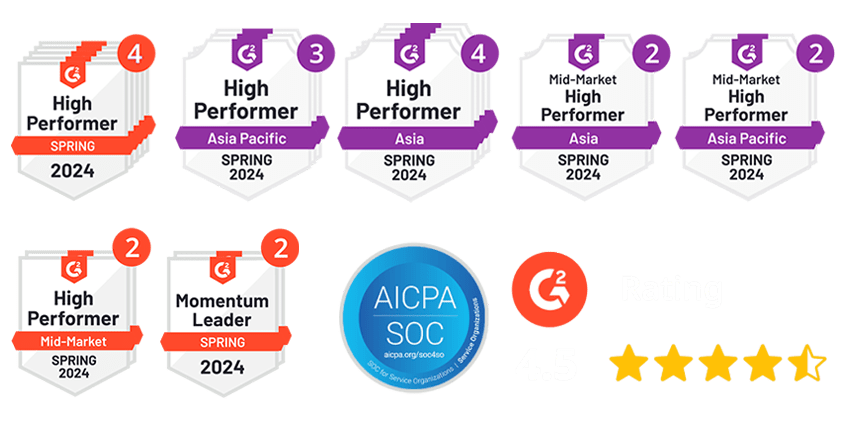Customer communication challenges can be a nightmare for businesses. Long hold times frustrate customers, inconsistent support quality damages relationships, and scaling human teams becomes expensive quickly. Traditional approaches often fail when you need reliable support across different time zones or languages without the overhead of maintaining a large staff.
AI voice agents address these pain points directly through intelligent systems that handle voice recognition and natural language processing. Unlike conventional customer communication that struggles with consistency and availability, these solutions provide steady support across industries without requiring human presence around the clock.
These voice systems handle much more than basic call handling. AI voice calling agents capture valuable customer information during every conversation, revealing patterns and insights that can improve your business strategies. They excel at managing repetitive tasks, reducing your need for extensive customer service teams while cutting labor expenses significantly.
The business case for implementing an AI voice agent platform goes beyond keeping up with technology trends. Companies gain competitive advantages through improved efficiency, enhanced customer experiences, and stronger financial performance. This article examines how these intelligent systems are changing business operations and why your organization should consider this technology now rather than waiting.
The Shift from Traditional IVRs to AI Voice Agents
Traditional Interactive Voice Response (IVR) systems have served as the foundation of customer service for over 40 years, yet they remain one of the most frustrating aspects of business communication. The limitations of these legacy systems have created an opportunity for AI voice agents to provide a superior alternative.
Limitations of legacy systems
Traditional IVR systems create significant barriers between businesses and their customers. Research reveals that 83% of customers prefer speaking to a human agent over navigating complex phone menus, with nearly 60% hanging up when faced with lengthy IVR sequences.
These legacy systems generate multiple problems for businesses:
- Rigid menu structures force customers through confusing navigation paths
- Poor speech recognition results in misunderstood requests
- Complex or nuanced queries cannot be handled effectively
- Interactions lack contextual awareness and feel impersonal
- Misrouting rates are high, sending callers to incorrect departments
The impact on business performance is substantial. One-third of phone calls to businesses go unanswered, with 85% of customers who don’t connect on their first attempt taking their business elsewhere.
Rise of AI voice calling agents
What makes AI voice agents different? These systems represent a fundamental change from menu-driven interactions to conversation-driven solutions. Unlike traditional IVR systems that follow predetermined scripts, AI voice agents use natural language processing, machine learning, and advanced speech recognition to understand customer intent and respond appropriately.
The market for AI voice agents is projected to grow from USD 2.4 billion in 2024 to USD 47.5 billion by 2034. This growth reflects their ability to conduct human-like conversations, maintain context throughout interactions, and access customer data instantly across various platforms.
Why businesses are making the switch
The business results from implementing AI voice agents demonstrate clear advantages. Organizations report significant improvements across key performance indicators:
1. First call resolution increased by 40-60%
2. Average handle time reduced by 30-50%
3. Customer satisfaction improved by 25-35%
4. Operational costs decreased by 20-40%
AI voice agents offer additional benefits that traditional systems cannot match. They provide 24/7 availability, multilingual support, and unlimited concurrent call handling capacity. Major retailers report that their AI voice agents now handle 70% of customer inquiries without human intervention while maintaining satisfaction scores higher than traditional call centers.
These systems also generate valuable insights into customer behavior through conversation analytics, enabling companies to identify emerging issues and create more personalized experiences for their customers.
Key Features That Make AI Voice Agents Powerful
Image Source: Codiste
Four core technological capabilities separate an effective AI voice agent from basic automated systems. These features work together to create conversations that feel natural while delivering the business intelligence and efficiency your organization needs.
1. Natural language understanding
Natural language understanding (NLU) enables AI voice agents to grasp the meaning behind customers’ words rather than just recognizing speech patterns. This sophisticated processing allows systems to:
- Analyze syntax and semantics to extract core meaning from various phrasings
- Identify user intent accurately, even with complex sentence structures
- Process emotional cues and context to understand the complete message
NLU systems employ tokenization to break down speech into analyzable segments, then map these elements onto a three-dimensional vector space to understand relationships between concepts. This approach allows agents to maintain understanding across lengthy conversations without losing context.
2. Real-time data access
Speed matters when customers need answers. AI voice agents excel through their ability to instantly retrieve and process information during calls. They can pull customer records, inventory status, or account details within seconds without interrupting the conversation flow. This rapid data processing enables agents to provide accurate, up-to-date responses that feel seamless to callers.
3. Contextual memory and personalization
Today’s AI voice agents maintain detailed records of every customer interaction. This “conversational memory” eliminates the frustration of repeating information across multiple calls. These systems store not just past issues but also communication preferences and successful resolution patterns, creating truly personalized experiences.
McKinsey research indicates companies that combine personalized experiences with generative AI are 1.7 times more likely to increase market share than those that don’t. This contextual awareness changes standard interactions into tailored conversations that build loyalty.
4. Integration with CRMs and backend systems
The full potential of AI voice agents emerges when they connect directly with business systems. Through seamless integration with CRM platforms, knowledge bases, and backend databases, agents can automatically update records, schedule appointments, and process transactions without human intervention. Companies report that these integrations can reduce call handling times by 30-50% while simultaneously improving accuracy.
Real Business Benefits of Using AI Voice Agents
Image Source: Velaro
Companies implementing AI voice agents see measurable improvements across key performance indicators. These systems deliver concrete results that impact both customer relationships and financial outcomes.
1. Improved customer experience and satisfaction
AI voice agents create personalized interactions by analyzing speech patterns and customer history to reduce frustration and boost satisfaction scores. Studies show that over 70% of communication is non-verbal, highlighting how voice data helps businesses understand customers beyond their actual words. This insight allows companies to spot emerging issues early and provide proactive solutions that strengthen customer relationships.
2. 24/7 availability and multilingual support
Voice AI technology operates continuously without the constraints of human working hours, handling customer inquiries at any time of day. These systems provide multilingual support across 10+ languages, including English, Spanish, French, and German. This global accessibility eliminates the need to hire additional staff for different time zones or language requirements.
3. Operational efficiency and cost savings
The financial impact of AI voice agents is significant. Gartner research shows organizations deploying AI in customer support can reduce operational costs by up to 30%. The cost comparison is striking—AI receptionists typically cost $30-$500 monthly compared to approximately $50,000 annually for human receptionists. Teams using voice intelligence report up to 90% reduction in manual tasks like call monitoring and note-taking.
4. Data collection and actionable insights
Peakflo AI Voice Agents handle large volumes of routine calls, outreach, follow-ups, and customer queries while delivering human-like, multilingual interactions and gathering valuable data. This information enables businesses to identify customer behavior patterns, refine strategies, and improve engagement. Voice analytics tools can process raw conversation data into actionable business intelligence that informs decision-making.
5. Revenue growth through upselling and cross-selling
AI voice agents excel at spotting revenue opportunities during natural conversations. Research indicates that AI-powered conversation analysis tools increase cross-sell conversion rates by 20-35% compared to scripted approaches. Companies using AI for upselling report average order value increases of up to 27%. This happens because AI systems identify optimal moments for offering relevant additional products based on conversation context rather than generic promotional scripts.
Where AI Voice Agents Are Making a Difference
Different industries face unique communication challenges that AI voice agents can address effectively. These systems excel in specific business areas where traditional human-only approaches struggle to maintain consistency and handle volume efficiently.
1. Customer service and support
Customer service teams report 94% of their service functions being handled by AI voice agents. These systems manage routine inquiries while analyzing customer tone and sentiment for personalized responses.
System Integration & Escalation: The agents operate continuously, feeding response outcomes directly into ERP workflows, escalating disputes, sending notifications, or scheduling human handoffs when necessary. All conversations get logged and integrated with financial records.
Banking and finance companies see particularly strong results. AI voice agents look up and analyze account information in seconds compared to the minutes required by human operators, cutting resolution times significantly.
2. Sales and lead qualification
Sales teams use AI voice calling agents to qualify prospects at scale. Organizations report up to 70% faster lead response times with approximately 25% higher conversion rates. Some companies achieve 3x higher profitability per lead through automation.
The time savings are substantial. Sales professionals typically lose over 500 hours annually to routine administrative tasks. Automation reclaims this time for higher-value activities.
3. Appointment scheduling and reminders
AI voice agents handle scheduling through natural conversation, accessing calendars via API connections to find and confirm available slots. These systems manage everything from healthcare appointments to financial consultations.
Healthcare providers benefit significantly as AI systems handle complex scheduling workflows from initial inquiries through follow-up reminders, reducing missed appointments.
4. Order tracking and delivery updates
E-commerce and logistics companies deal with order status inquiries for over 60% of their support calls. AI voice agents connect directly with order management systems to provide real-time shipment tracking with sub-500ms latency.
This capability allows businesses to handle unlimited concurrent calls about order status. Industries with high-volume tracking needs,ike e-commerce, benefit most, where questions about delivery dates and shipping partners are constant.
5. Collection Call Handling
AI voice agents are transforming collections by automating routine follow-ups on outstanding payments. These agents initiate calls, verify invoice details, and capture payment commitments or promise-to-pay dates—all while updating ERP or AR systems in real-time.
They can also escalate unresponsive or high-risk cases to human agents, notify internal teams via Slack or email, and log all interactions for audit purposes. Companies using AI voice agents for collections report up to 50% faster cash recovery cycles and significantly reduced manual workload for finance teams.
Industries with recurring payments or high invoice volumes, such as SaaS, utilities, and wholesale distribution, see the greatest impact, as AI ensures timely follow-ups without overwhelming internal teams.
Choosing the Best AI Voice Agent Platform
Selecting an AI voice agent platform can feel overwhelming with dozens of options available. The platform you choose determines whether your customer interactions improve or create new frustrations, making this decision critical for your return on investment.
What to look for in a platform
Start by evaluating industry fit and domain expertise that matches your sector—vertical platforms provide specialized knowledge for regulated industries, while horizontal frameworks offer broader flexibility. Your platform must integrate smoothly with existing CRM, helpdesk tools, and backend systems to ensure seamless data flow.
Multilingual capabilities become essential for global businesses, allowing the system to detect and respond in multiple languages automatically. Look for platforms that handle smart interruption handling to maintain natural conversation flow when customers interject mid-sentence.
Security and compliance requirements cannot be overlooked, particularly for healthcare, financial services, and other regulated industries. Platforms should provide end-to-end encryption and adhere to standards like GDPR, HIPAA, and SOC 2.
Tips for successful implementation
Create a clear implementation strategy with realistic timelines—typically 3-6 months for an initial version. The first 90 days are critical for establishing a strong foundation.
Start with a phased rollout approach. Begin with calls triggered by specific IVR digits or limit AI to narrow use cases during initial deployment. This approach minimizes risk while allowing you to gather performance data and make adjustments.
Establish a structured feedback loop for continuous improvement. Regular review of call data, dashboard analytics, and agent feedback helps identify enhancement opportunities. To see agentic workflows and AI voice agents in action, schedule a call with Peakflo experts today.
Conclusion
AI voice agents address the core customer service challenges that businesses face today. These intelligent systems provide consistent, personalized experiences while reducing operational costs significantly. Their ability to operate continuously across multiple languages keeps your business accessible regardless of time zones or locations.
The shift from rigid IVR systems to conversational AI represents a fundamental change in how businesses handle customer interactions. Instead of forcing customers through confusing menu options, AI voice agents conduct natural conversations that resolve issues quickly and capture valuable insights. Businesses using this technology report measurable improvements across key performance indicators, from enhanced customer satisfaction to increased revenue.
The question isn’t whether AI voice agents will become standard business tools. The technology has matured, results are proven, and early adopters are already gaining significant advantages over competitors using outdated approaches.
Your customers expect efficient, seamless service experiences. AI voice agent delivers exactly that while gathering insights to help your business grow. The implementation challenges are manageable, the benefits are measurable, and the competitive advantages are clear.
Try out Peakflo’s AI Voice Agent solutions to see how automated customer interactions can improve your business operations and customer satisfaction.
FAQs
Q1. How are AI voice agents transforming customer service in 2025?
AI voice agents are revolutionizing customer service by providing 24/7 support, natural language understanding, and personalized interactions. They can handle multiple inquiries simultaneously, reduce wait times, and offer consistent service quality across various channels.
Q2. What are the key benefits of implementing AI voice agents for businesses?
Businesses implementing AI voice agents can expect improved customer satisfaction, significant cost savings, increased operational efficiency, and valuable data insights. These systems also enable 24/7 availability, multilingual support, and opportunities for revenue growth through intelligent upselling and cross-selling.
Q3. How do AI voice agents compare to traditional IVR systems?
Unlike traditional IVR systems, AI voice agents use natural language processing to understand customer intent, provide contextual responses, and handle complex queries. They offer a more conversational and personalized experience, leading to higher customer satisfaction and improved resolution rates.
Q4. In which areas are AI voice agents making the most impact?
AI voice agents are particularly effective in customer service and support, sales and lead qualification, appointment scheduling, and order tracking. They excel at handling routine inquiries, qualifying leads, managing complex scheduling, and providing real-time updates across various industries.
Q5. What should businesses consider when choosing an AI voice agent platform?
When selecting an AI voice agent platform, businesses should consider industry fit, integration capabilities with existing systems, multilingual support, security and compliance features, and the platform’s ability to handle natural conversations. It’s also important to evaluate the implementation process and ongoing support provided by the platform.









![Why AI Sales Calls Are Making Good Sales Reps Even Better [2025 Guide] ai sales calls](https://cdn-kmjmp.nitrocdn.com/YvtqmrsiHUxqerlSiZgbfzqqTARWTElr/assets/images/optimized/rev-834053b/blog.peakflo.co/wp-content/uploads/2025/09/65168cf6-3001-4733-8cbc-12d5684cf449-218x150.webp)

































